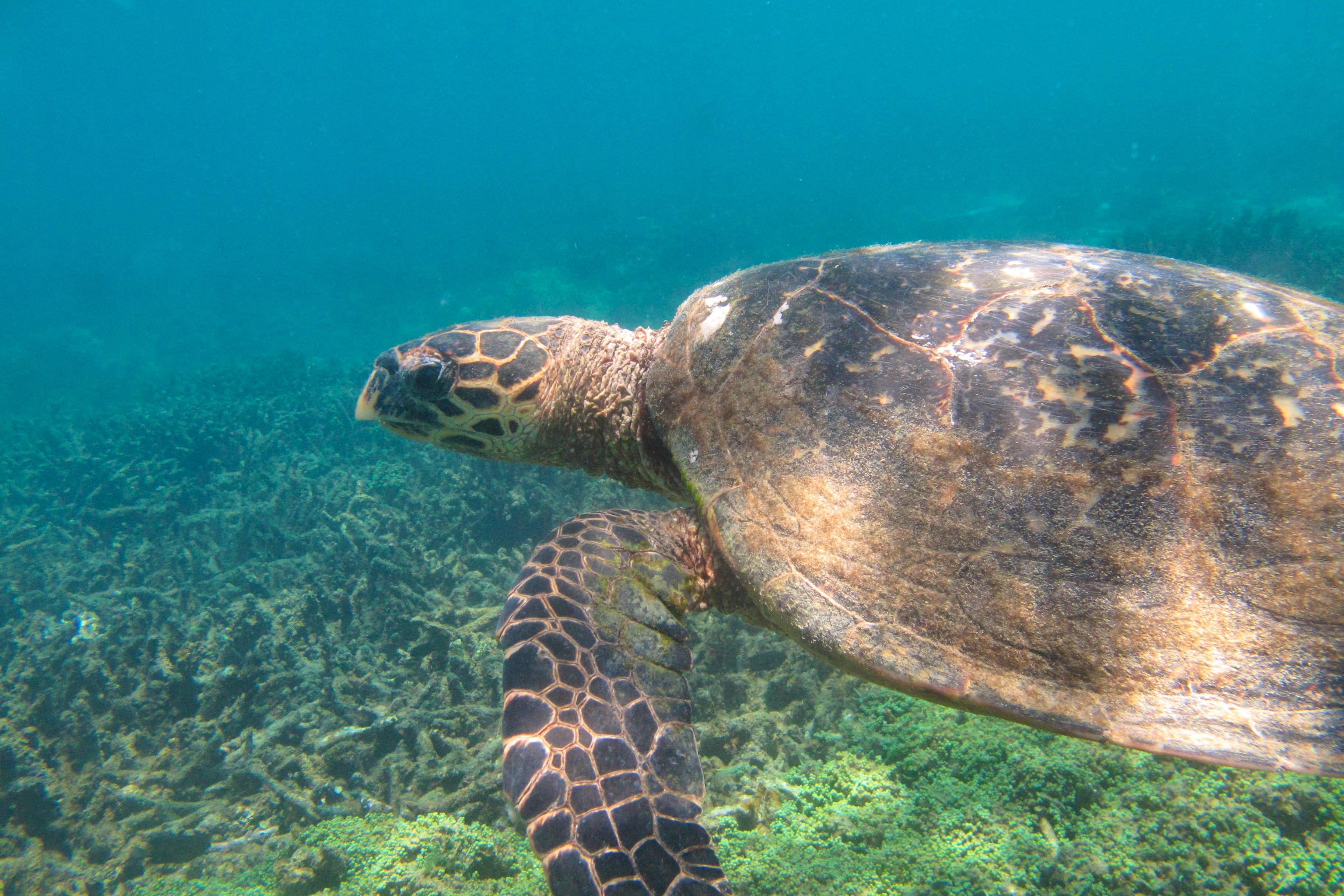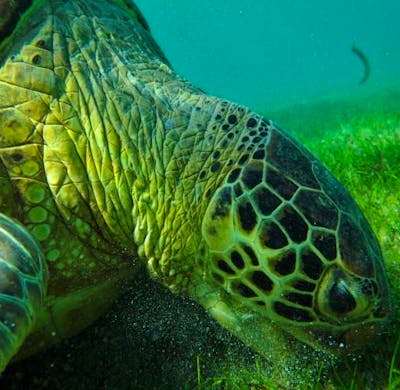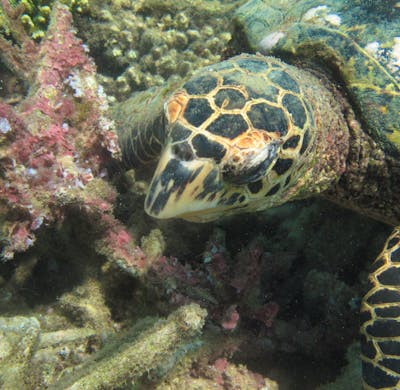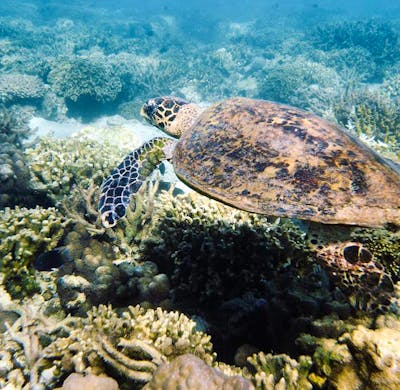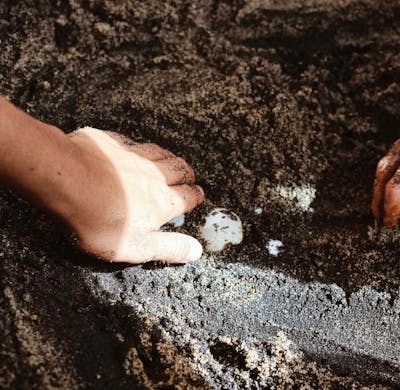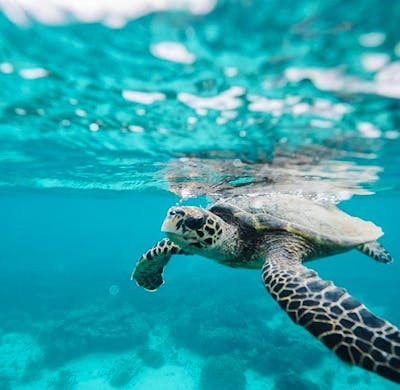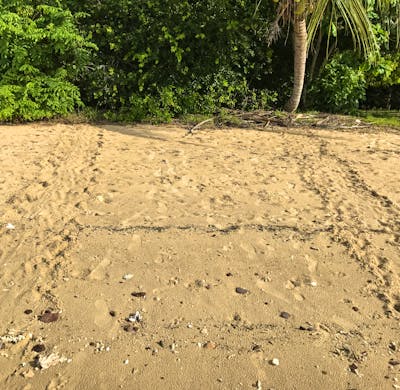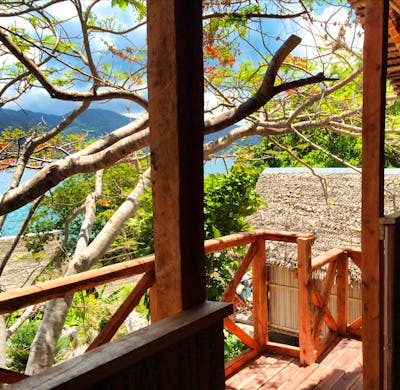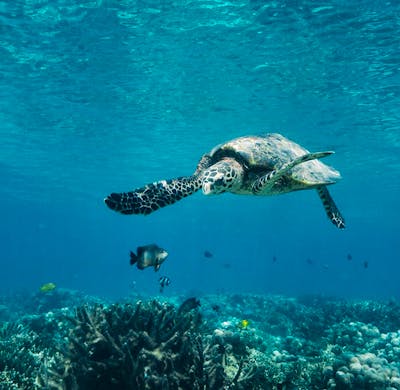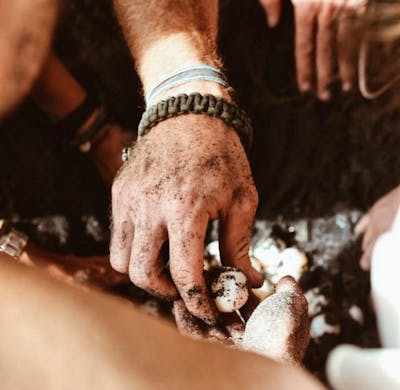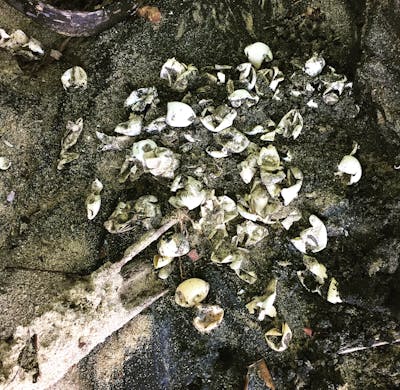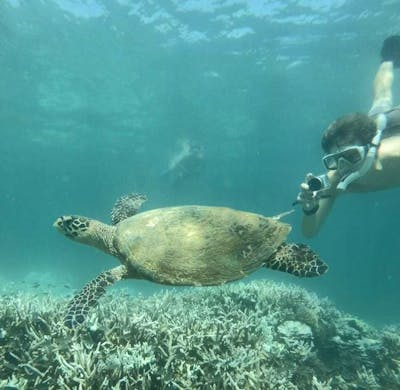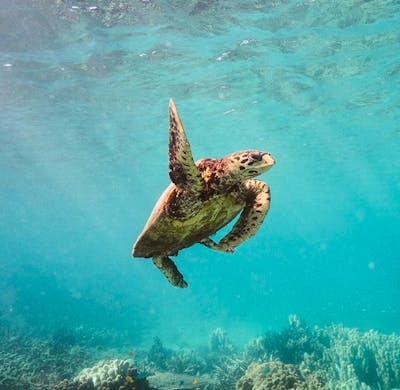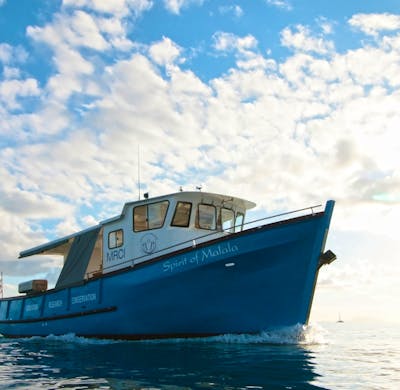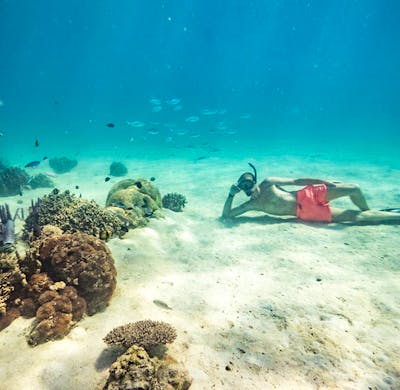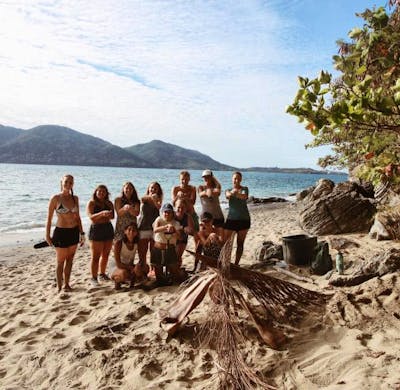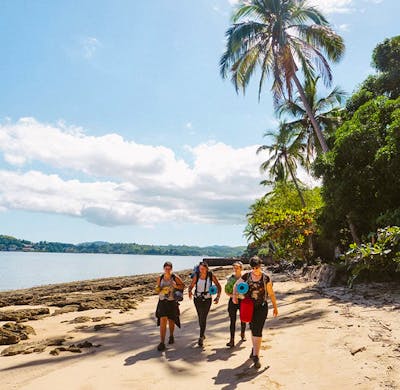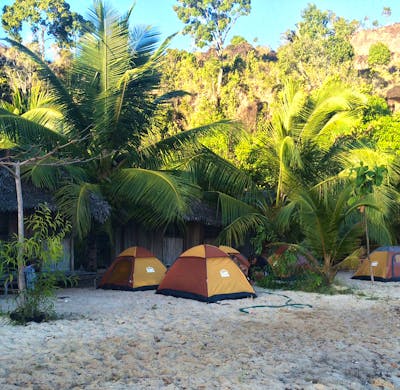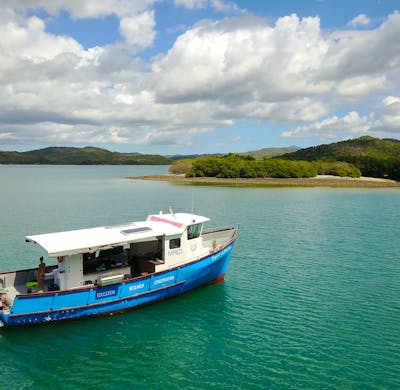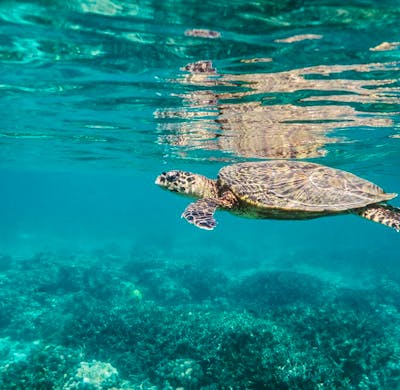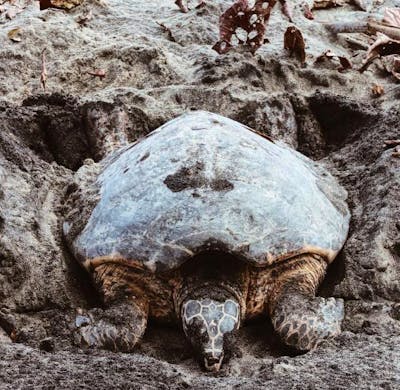Sea Turtle Monitoring Program:
Madagascar Research and Conservation Institute's Sea Turtle Monitoring Program has been established to identify and develop Safe Turtle Breeding Zones in North Western Madagascar. MRCI has successfully, with the support of the local community, implemented a “Safe Turtle Nesting Zone” on Nosy Komba Island. As part of this initiative, MRCI have employed security personnel to provide 24 hour monitoring of this nesting zone to ensure the safety of the turtles and their eggs.
MRCI volunteers will assist in identifying nesting areas by visiting remote beaches on islands surrounding the island of Nosy Be. This program gives volunteers the opportunity to get up close to these beautiful creatures whilst helping to ensure the health and survival of the species into future.
The Sea Turtle Monitoring Program runs year round with the focus of the program shifting depending on the season. During the nesting season from October to March each year, when turtles come ashore to lay their eggs, the project focuses on preventing the poaching of mothers and nests, collecting data on the nesting turtles and their eggs, and moving nests that have been laid in locations that are unsuitable for hatching success.
During the dry season, from April to September, the program focuses on collecting ID and behavioural data on turtles in the water, rehabilitating nesting beach and educating local communities on the importance of turtles in the ecosystem.
The main objective and focus on our Sea Turtle Monitoring Program is to collect and record species, nesting and size related data for estimating population dynamics and nesting distributions in North Western Madagascar.
Currently large numbers of turtle eggs are being plundered on many of the remote beaches, and hatchlings and fully reproductive turtles are shockingly being harvested for the souvenir trade. Due to the already naturally low survival rate of turtle hatchlings, this is having devastating impacts on population numbers.
Identifying and implementing protection measures for these breading sites is paramount to safeguarding the species in this area. With the collaborative effort of our volunteers, who play a vitally important role in assisting to achieve our goals, MRCI will continue to strive to protect endangered sea turtle species in their natural habitat as well as to promote public awareness by further collaborating with local communities and national authorities. Our primary goals are:
- to map and identify beaches used as nesting sites.
- to identify species diversity and numbers.
- to engage and establish a relationship with the local communities enabling us to include them in our conservation efforts.
- to monitor and remove plastic waste and other harmful products from the beaches.
Two species of turtle are monitored; the critically endangered Hawksbill Sea Turtle (Eretmochelys imbricata) and the endangered Green Sea Turtle (Chelonia mydas).
Sadly, population numbers of both species are in decline with harvesting of eggs, hatchlings and adults being the primary threat. Hawksbill turtle numbers have fallen by as much as 80% in the last 10 years, and the annual number of nesting female Green Sea Turtle species has declined by up to 67% over the last 3 generations. This has left both species at high risk of extinction if nothing is done to safeguard their future.
The Green Sea turtle is the most widespread and well-known species in tropical and sub-tropical waters. They are the largest of the hard-shell turtle species and can grow up to 120cm in shell length and can weigh over 136kg. The name Green Sea Turtle derives from the colour of their fat, rather than the colour of their shell. The colour of their shells can range from a yellow/green to a reddish/brown to sometimes almost black.
Hawksbills Sea Turtle species are also found in tropical and sub-tropical regions. Adult Hawksbill Sea Turtles can grow to 90cm in shell length and can weigh up to 91kg. The Hawksbill Sea Turtle is named for its pointed, sharp bird-like beak. The shell of the Hawksbill Sea Turtle has a “tortoise shell” colour that ranges from dark to golden brown, with streaks of orange, yellow, brown and black. This is the only sea turtle that has overlapping scutes on the top shell (similar to roof shingles).
The basic volunteer beach patrol protocol when a turtle is found is:
- Species is identified
- Carapace is measured
- Flippers are checked for calluses or notches (these indicate that the turtle has been previously tagged)
- Photographs are taken
- GPS location point is recorded
Age: Our volunteers range in age from 18 to retirees and everyone in between, though most are in their early to mid-twenties.
Number of Volunteers: MRCI’s research centre at Turtle Cove can accommodate up to 54 volunteers at a time across all programs. There are usually between 10 and 20 volunteers participating in the Sea Turtle Monitoring Program at any given time.
Languages Spoken: All program staff and volunteers must be able to speak, write and understand English. Our program staff and volunteers come from all over the world and speak a myriad of other languages in additional to English. Locally, our operations staff and the people of Madagascar speak Malagasy and some French. Volunteers have the chance to attend free Malagasy lessons offered on camp and learn more about the language and culture in this beautiful country.
Essential info: Volunteers are expected to have their own health insurance. Vaccinations are not typically required to enter Madagascar, however this may vary depending on your travel path. We recommend consulting a travel doctor about vaccinations and medications. Recommended vaccinations for Madagascar include: yellow fever, tetanus, Hepatitis A, Hepatitis B, typhoid, and rabies.
In addition, we recommend carrying preventative agents with you including sun screen, after sun lotion, mosquito repellent, re-hydration supplements, anti-malarial medications, and anything else recommended by your doctor. There is access to good, fairly priced medical care here in country if needed. Due to the hot, humid climate, it is incredibly important to drink enough water. We have filtered drinking water available on camp; just be sure to bring a good reusable bottle.
What Is included in the fee: Sea Turtle Conservation volunteers receive training on species identification, conducting field surveys, methodology, equipment set up and data collation.
Volunteers also receive:
- Sleeping accommodations for the duration of their volunteer time
- Three meals per day, seven days per week on camp
- Supervision and training by staff
- Scientific Survey Materials (i.e. GPS, rulers, measuring tape, etc…)
Insurance: Volunteers are expected to purchase their own health insurance.
Not Included:- Flights
- Visa costs
- Personal items
Currency: In Madagascar the official currency is the Malagasy Ariary (MGA), which can only be exchanged in Madagascar. There are a number VISA ATMs located in Hellville which volunteers can draw cash from. We do however advise that you bring some Euro’s along with you
Passport and Visa: All visitors require visas and a one to three month single entry visa may be obtained on arrival at the airport. We do recommend you check with the Consulate General as visa requirements can change at any time. A passport valid for 6 months after date of return is required. Please ensure you have at least two blank pages available in your passport before commencement of travel.
VISAS
30-Day visa: 35 Euros / 37 USD
60-day visa: 40 Euros / 45 USD
Most nationalities can get a visa upon arrival at the airport in Madagascar or the Madagascar
embassy in the country of departure. You can purchase either a 30 or 60-day visa. There are
no ATMs or credit card facilities at the airports so you will need to bring enough cash to pay
for your visa when you land. The visa costs are as follows:
* Visas may be extended to 90 days for $75 once in-country
Due to its structure, this program is classified as a tourist trip. Volunteers participate on a
project for three months or less, work an average of three to five hours daily (not full-time),
and do not receive any pay or free accommodation/meals in compensation for work. That
qualifies these types of trips as “tourist” trips, therefore, we recommend you select “tourism”
as your reason for travel on your visa. Other visa types may be available, however, they are
often unnecessary, expensive and time-consuming.
What to bring along:
- Personal Items - Essential Items for all Volunteers
- Lightweight waterproof rain jacket
- T-shirts/vests
- Light long-sleeved sweatshirt/ jumper/ fleece
- Trousers
- Shorts
- Underwear
- Swimming costume/bikini/board shorts
- Sunhat
- Sunglasses
- Walking boots or good trainers /sneakers
- Flip-flops
- Day pack (waterproof)
- Dry bag/ziplock bags that will keep items dry
- Lightweight single person mosquito net
- Cotton sleeping bag liner and/or single sheet & pillow case.
- Sleeping bag if coming in the cooler months (June-August)
- Towel or sarong
- Toiletries (soap, shampoo, razor, tampons, toothpaste, toothbrush)
- Sunscreen (water-resistant, preferably biodegradable)
- Insect repellent
- Head torch (with rechargeable batteries)
- Photocopy of passport, travel insurance details, dive qualifications (if relevant) and other important travel documents
- Debit card/credit card
- Spending money
- Solar Panel Charger
- Personal Medical Kit (example items: Anti-malarial tablets; Paracetamol / Ibuprofen; Antihistamine pills / cream; Rehydration tablets / sachets; Immodium; Multivitamins; Antiseptic cream or spray; Motion sickness pills if prone; Bandage / Plasters; Dressings / Micropore tape; After sun lotion or gel;
Optional Items for all Volunteers:- Battery pack (to use in conjunction with your solar panel)
- Mobile phone (you can buy a local SIM card for around US$10)
- A padlock to secure personal items
- Laptop/iPad/iPhone
- Camera (waterproof)
- Books
- Water bottle
- Sarong
- Snorkeling gear (flippers; mask; snorkel)
- A nice set of clothes if you want to go out for dinner or dancing
- Rash vest
- Talcum powder
- Treats/food difficult to get in Madagascar
- Travel guide (many volunteers find Lonely Planet to be very helpful for preparation and once they are in Madagascar)
HEALTH CONDITIONS
We kindly request that all volunteers inform our volunteer coordinator and senior staff of
any health conditions, mental illnesses, disabilities, or other relevant information that may
affect their participation in camp activities. Please be assured that any such information will
be kept strictly confidential. It is important for us to have this information to ensure that we
provide fair treatment and ensure your safety during your stay on camp.
INTERNET
Wi-Fi is not available on camp, however, there is Wi-Fi access in the neighbouring village of
Ampang, about a half-hour hike from camp. Volunteers can purchase a local sim card in
Hellville along with 2GB of data for $5.
MOBILE PHONES
Volunteers can bring their mobile phones and purchase a local SIM card and credit for calling
and data upon arrival. If their phone’s SIM is locked, they have the option of purchasing a
local phone. This is great for keeping in touch with local staff, other volunteers and loved
ones at home. Once you have purchased a SIM card and data package, you can access the
internet via cell service in most places on Nosy Be and Nosy Komba, including camp. With
enough credit loaded on, you can make both domestic and international calls. The country
code for calling Madagascar is +261.
ELECTRICAL APPLIANCES
The most common type of wall plug in Madagascar is the typical European rounded twoprong plug (Type C) and the rounded two-prong plug with a hole for the male grounding pin
(Type E). The voltage is 20V and the frequency is 50Hz.
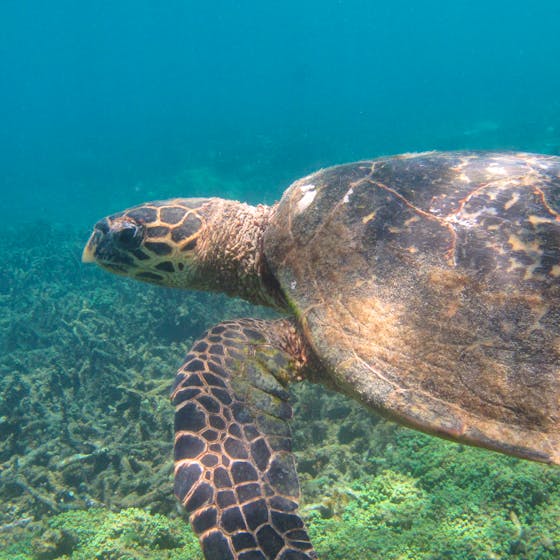
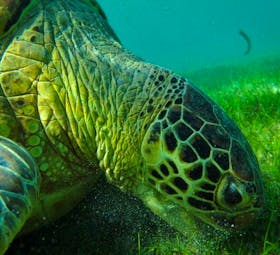
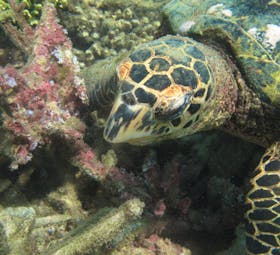
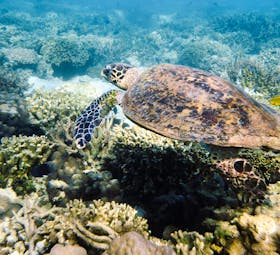
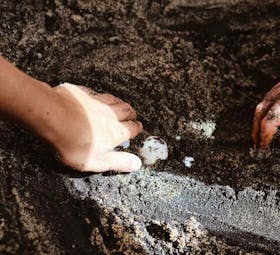
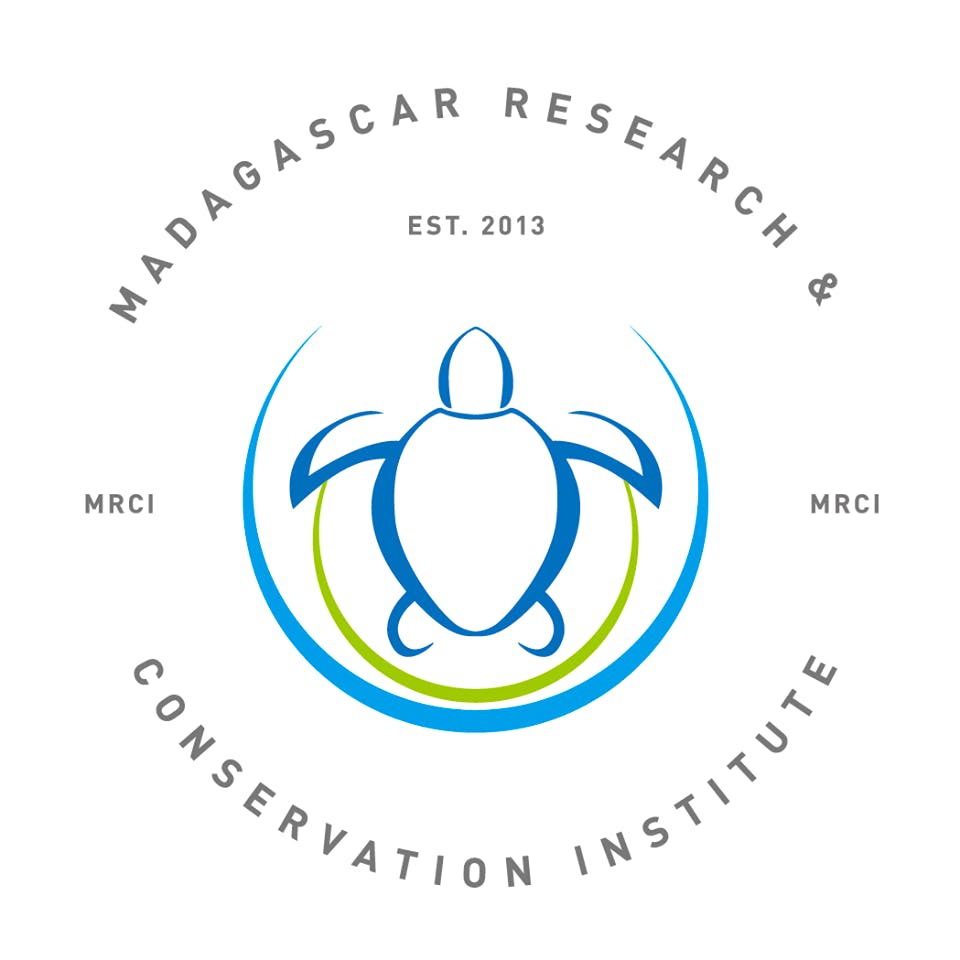
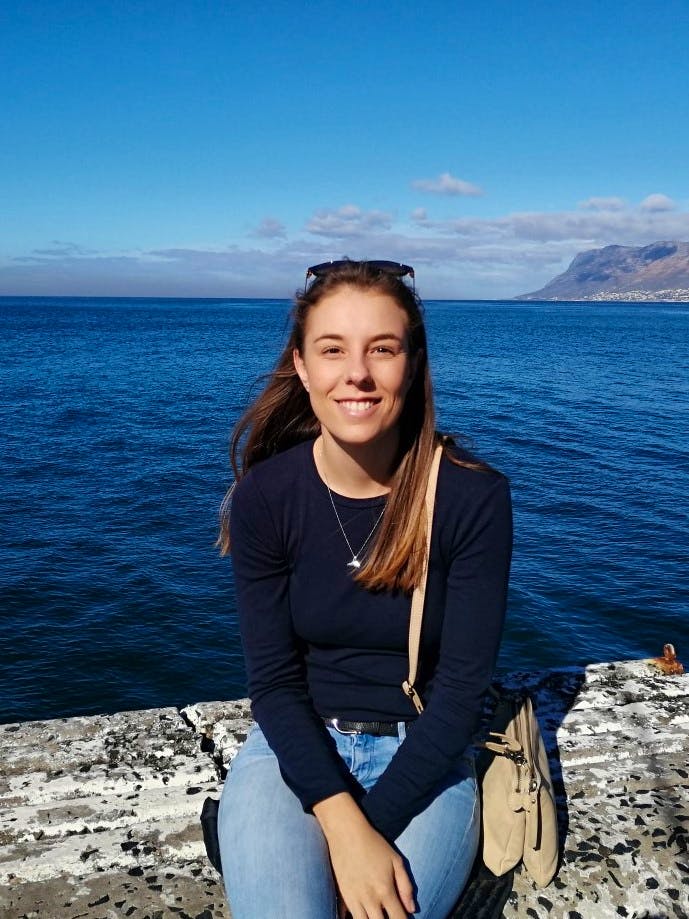
 4.6
4.6

